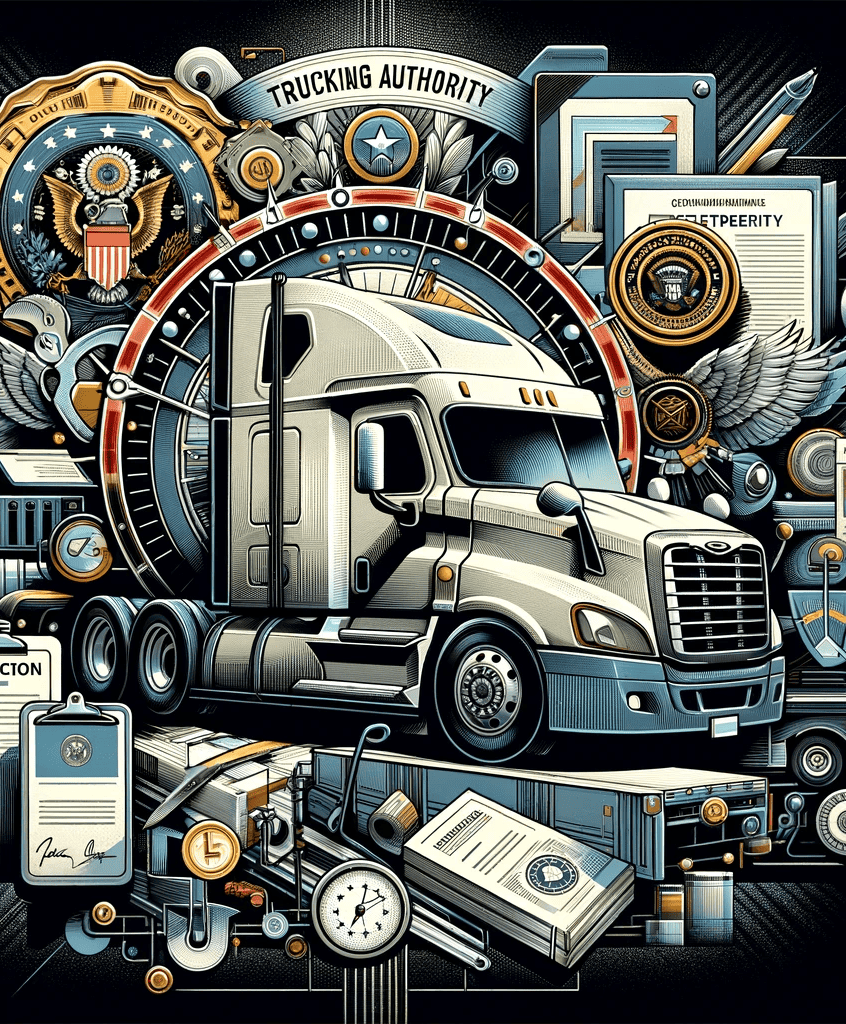What is Trucking Authority? How to Obtain in 10 Easy Steps
Freedom Heavy Haul can offer expedited Pickup and Delivery for any size shipment anywhere in the USA. Contact us today for No Hassle, No Pressure Pricing.
Trucking authority is a critical aspect of the trucking industry, granting legal permission for companies to operate as commercial carriers. In this article, you will learn what is trucking authority and how to get it in easy steps. Other than that, we will also explore the intricacies of obtaining and maintaining this authority is vital for the success and legality of any trucking business.
What is Trucking Authority and How to Obtain
Before embarking on the process of obtaining trucking authority, it’s important to assess various factors such as market demand, operational costs, compliance requirements, and business goals. This preliminary assessment helps in creating a sustainable business model.
Choosing the Right Business Structure for Your Trucking Company
Deciding on the business structure, whether it’s a sole proprietorship, partnership, LLC, or corporation, is crucial. Each structure offers different benefits and levels of personal liability protection, tax implications, and administrative requirements.
Essential Requirements for Acquiring Trucking Authority
Acquiring trucking authority involves meeting several regulatory requirements set forth by government agencies. This includes obtaining necessary licenses, adhering to safety standards, and ensuring proper documentation and record-keeping.
Different Types of Trucking Authority and Their Purposes
Different types of trucking authority serve various purposes within the transportation and logistics industry. Here’s a summary of some key types:
- Motor Carrier (MC) Authority: This is required for companies that operate commercial vehicles with a gross vehicle weight rating (GVWR) of 10,001 pounds or more, allowing them to transport goods for hire across state lines.
- Broker Authority: Needed by companies that arrange for the transportation of goods but do not operate commercial vehicles themselves. Brokers act as intermediaries between shippers and carriers.
- Freight Forwarder Authority: Required for companies that arrange for the transportation of goods on behalf of a shipper but do not take possession of the goods.
- USDOT Number: A unique identification number assigned to companies operating commercial vehicles with a GVWR of 10,001 pounds or more, crucial for interstate operations.
- State Authority: Some states may require additional authority, like a state operating authority or a state-specific USDOT number, for companies operating commercial vehicles within the state.
- Other Authorities: This includes the International Fuel Tax Agreement (IFTA), the International Registration Plan (IRP), and other permits required for the movement of commercial vehicles across different states.
Understanding Insurance Requirements for Trucking Authority
Insurance is a non-negotiable aspect of obtaining trucking authority. Depending on the type of cargo and operation, different levels and types of insurance, such as liability and cargo insurance, are required to protect the business, its assets, and its clients.
Adapting Your Trucking Business in a Shifting Economy
The trucking industry is not immune to economic fluctuations. It’s essential for trucking businesses to adapt to changes in fuel prices, labor markets, and regulatory environments to remain competitive and compliant.
Timeline: How Long It Takes to Secure Trucking Authority
The time frame to obtain trucking authority can vary, typically taking several weeks to a few months. This process involves completing applications, awaiting approvals, and ensuring all regulatory requirements are met.

Financial Aspects: The Cost of Obtaining Trucking Authority
The cost of obtaining trucking authority includes application fees, insurance premiums, and potential consultancy fees. It’s a significant investment that requires careful financial planning and management.
Initiating the Trucking Authority Process: Where to Begin
Starting the process involves understanding the specific requirements for your business type and operations. This includes researching the relevant state and federal regulations and preparing the necessary documentation.
Step-by-Step Guide to Acquiring Trucking Authority
The process of acquiring trucking authority is multi-faceted and requires attention to detail to ensure compliance with all legal and regulatory standards.
1. Business Registration: Setting Up Your Trucking Company
The first step is to legally establish your trucking business. This involves choosing a business name, registering with state authorities, and obtaining any necessary local business licenses.
2. Securing an Employer Identification Number (EIN)
An EIN is required for tax purposes and is obtained from the IRS. It’s essential for opening business bank accounts and filing tax returns.
3. Acquiring a USDOT Number for Compliance
The USDOT number is a unique identifier required for all commercial vehicles transporting passengers or hauling cargo in interstate commerce.
4. Applying for an MC (Motor Carrier) Number
The MC Number is necessary for carriers who plan to transport goods across state lines. It’s obtained through the Federal Motor Carrier Safety Administration (FMCSA).
5. Filing a BOC-3 Form and Establishing Insurance Coverage
The BOC-3 form designates a legal agent in each state where the business operates. Additionally, securing the appropriate insurance coverage is crucial at this stage.
6. Understanding and Paying the Heavy Vehicle Use Tax (HVUT)
HVUT is a federal tax imposed on vehicles with a gross weight of 55,000 pounds or more, used on public highways.
7. Navigating the International Registration Plan (IRP) for Apportioned Plates
The IRP is a registration reciprocity agreement among states in the U.S. and provinces in Canada, providing for payment of commercial motor vehicle fees.
8. Establishing an International Fuel Tax Agreement (IFTA) Account
IFTA simplifies the reporting of fuel use by motor carriers operating in multiple jurisdictions.
9. Completing the Unified Carrier Registration (UCR) Process
UCR is a mandatory registration for companies operating commercial vehicles in interstate or international commerce.
10. Joining a Drug and Alcohol Testing Consortium
Compliance with FMCSA’s drug and alcohol testing regulations is mandatory, and joining a consortium helps manage this requirement.
Regulatory Compliance for Trucking Companies
Maintaining compliance with DOT and FMCSA regulations is a continuous process. This includes regular vehicle inspections, driver qualification files, hours-of-service logs, and accident records.
Staying Up-to-Date with DOT and FMCSA Regulations
Keeping abreast of changes in DOT and FMCSA regulations is vital for the ongoing legal operation of a trucking business. This involves regular training and updates for staff and management.
Expanding Your Trucking Business: Beyond Basic Authority
Once basic authority is established, there are opportunities for expanding services, such as adding different types of cargo or expanding into new geographic areas.

Exploring Growth Opportunities and Expanding Service Areas
Expanding service areas and exploring new market segments can significantly grow a trucking business. This requires additional planning, investment, and possibly extending the scope of the existing trucking authority.
Technology in Trucking: Streamlining the Authority Process
Modern technology plays a crucial role in streamlining the trucking authority process. Digital tools and software can simplify application processes, compliance tracking, and operational management.
Leveraging Digital Tools for Efficient Management
Implementing digital tools such as transportation management systems (TMS), GPS tracking, and electronic logging devices (ELDs) can enhance efficiency and compliance in trucking operations.
Common Challenges and Solutions in Acquiring Trucking Authority
The journey to acquiring trucking authority is often fraught with challenges, ranging from bureaucratic hurdles to financial constraints.
Addressing Roadblocks in the Application Process
Navigating the complexities of the application process can be daunting. Seeking expert advice, thorough preparation, and patience are key to overcoming these challenges.
Future of Trucking Authority: Trends and Predictions
The trucking industry is evolving rapidly, with changes in regulations, technological advancements, and industry standards shaping the future of trucking authority.
Anticipating Changes in Regulations and Industry Standards
Staying informed about future trends and potential regulatory changes is crucial for long-term success in the trucking industry. This proactive approach ensures that a trucking business remains compliant and competitive.







